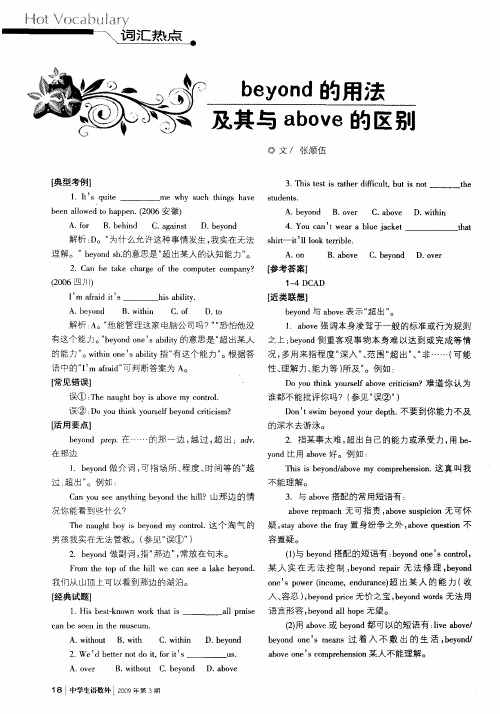beyond用法总结
- 格式:docx
- 大小:14.51 KB
- 文档页数:4



一、beyond作介词用时,使用最广,常用于下列几种情况:1.表示位置,意思是“在……的那一边;在……之外;在更远处”。
例如:Beyond the river stood a power station. 过了这条河就是一个发电站。
The sea is beyond that hill. 大海在山的那边。
2.表示时间,其意为“迟于;超过”例如: Some shops keep open beyond midnight有些商店营业到半夜以后。
He never sees beyond the present.他从未看到将来。
3.表示范围、水平、限度、能力等,意思是“超出;多于;为……所不能及”。
在句中常作表语、定语或状语。
作表语Your work is beyond all praise. 你的作品叫人赞扬不尽。
②作定语These were matters beyond his understanding as yet.这些事情他那时候还不了解。
③作状语We succeeded beyond our hopes.我们获得如此之成功,是我们始料所不及的。
She was really touched beyond words. 她确实感动得无法形容。
4.用在否定和疑问句中,意思是“除……之外”。
例如:I know nothing beyond what he told me.除了他告诉我的以外,别的我都不知道。
Is there anything more you can say beyond that?除了那点之外,你还能说些什么吗? 5.beyond有时还可表示年龄或数量,意思是“超过”。
例如:He didn't believe in people living beyond 100.他不相信人能活到100岁以上。
At the meeting there were not beyond 20 people.到会的人不超过二十。


beyond的用法
beyond用作介词时表示“超出”、“远于”、“除...之外”等含义;beyond用作副词表示“在更远处”,“另外”等含义;用作名词时表示“远处”。
1、beyond作“除…之外”时,主要用于否定句和疑问句。
2、beyond用作介词时例句如下:
Such philosophical subtleties are beyond my reach.
这种深奥的哲理我可无法理解。
The scenery there was beautiful beyond expression.
那儿的风景美丽得无法形容。
3、beyond用作副词时,例句如下:
They crossed the mountains and travelled to the valleys beyond.
他们越过群山,到了那边的山谷。
The immediate future is clear, but it's hard to tell what lies beyond.
近期内的情况很清楚,但很难说以后如何。
4、beyond用作名词时,例句如下:
In future, men can travel to the moon and beyond.
未来人们能到月球或更远处去旅行。
What can we know of the beyond?
我们对来世能知道些什么呢?。

beyond的用法及短语
1. Beyond的常见用法是作为介词,表示"超出"、"在...之外"、"超过"等含义。
例句:The little girl's talent goes beyond her age.(这个小女孩的才华超过了她的年龄。
)
2. Beyond也可作副词,表示"更远"、"更进一步"等含义。
例句:We need to look beyond the surface and dig deeper.(我们需要超越表面,深入了解。
)
3. "Beyond"还可以作为名词,表示"偏离、超过某一点"。
例句:The speed of the car was beyond the limit.(这辆车的速度超过了限速。
)
常见的与"beyond"搭配的短语如下:
1. Beyond belief: 难以置信
2. Beyond doubt: 毫无疑问
3. Beyond recognition:难以辨认
4. Beyond repair: 无法修复
5. Beyond compare: 无可比拟
6. Beyond someone's control: 超出某人的控制范围
7. Beyond one's reach: 超出某人的能力范围
8. Beyond measure: 无法估量。
beyond 的用法
"beyond" 是一个介词,常用于表示在空间、时间或程度上超出某种限制或范围。
以下是几种常见的用法:
1. 表示在空间上超出:例如,“beyond the mountains”(超过山脉),“beyond the horizon”(超越地平线)。
2. 表示在时间上超出:例如,“beyond midnight”(午夜之后),“beyond next week”(下周之后)。
3. 表示在程度上超出:例如,“beyond my abilities”(超出我的能力范围),“beyond comprehension”(难以理解)。
4. 表示远远超过:例如,“beyond expectations”(超出预期),“beyond imagination”(超乎想象)。
此外,"beyond" 还可以作为副词使用,表示在某种方面或程度上超出。
如,“The view is beyond beautiful”(风景美得超乎寻常)。
需要注意的是,"beyond" 在句子中常常与动词、名词或介词短语搭配使用,具体用法还需根据上下文进行判断。
一、beyond作介词用时,使用最广,常用于下列几种情况:
1.表示位置,意思是“在……的那一边;在……之外;在更远处”。
例如:Beyond the river stood a power station. 过了这条河就是一个发电站。
The sea is beyond that hill.
大海在山的那边。
2.表示时间,其意为“迟于;超过”。
例如:
Some shops keep open beyond midnight 有些商店营业到半夜以后。
He never sees beyond the present.他从未看到将来。
3.表示范围、水平、限度、能力等,意思是“超出;多于;为……所不能及”。
在句中常作表语、定语或状语。
①作表语
Your work is beyond all praise.
你的作品叫人赞扬不尽。
②作定语
These were matters beyond his
understanding as yet.
这些事情他那时候还不了解。
③作状语
We succeeded beyond our hopes.
我们获得如此之成功,是我们始料所不及的。
She was really touched beyond words. 她确实感动得无法形容。
4.用在否定和疑问句中,意思是“除……之外”。
例如:
I know nothing beyond what he told me.
除了他告诉我的以外,别的我都不知道。
Is there anything more you can say beyond that?
除了那点之外,你还能说些什么吗?
5.beyond有时还可表示年龄或数量,意思是“超过”。
例如:
He didn't believe in people living beyond 100.
他不相信人能活到100岁以上。
At the meeting there were not beyond 20 people.
到会的人不超过二十。
二、beyond也常作副词用,主要有下面两种用法:
1.指时空或正在进行中的活动,意思是“在远处;向远处;更远处”。
例如:
If we cross the mountains we may find people living in the valley beyond.如果我们翻过这些大山,我们就可以发现在远处山谷中生活的人们。
I'll go with you to the bridge,but not a step beyond.我愿意同你一道走到桥头,但再远的地方一步也不愿意去。
2.表示外加,意思是“此外;以外”。
例如:
He told me nothing beyond.此外他没告诉我什么。
三、beyond也可作名词用,常有下面三种情况:
1.指“远处的东西”。
例如:
That is a river for small boats expending
30miles back into the beyond.
那是一条小船能上行30英里的河流。
2.表示超出普通经验范围的某种事物。
例如:
What can we poor human beings know of the great beyond?
我们可怜的人类能知道来世的什么情况呢?
3.表示远处的性质或状态。
例如:
His dream of beyond was forgotten in the actual life.
他的不着边际的梦想被现实生活所吞没。